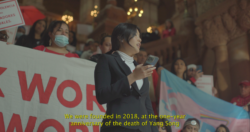‘Fly in Power’ is a call to action
Content Warning: This article contains a brief mention of a suicide or murder.
When Song Yang died in a police raid in 2017, she became a symbol of sex trafficking victims in the massage parlors of New York City. The documentary “Fly in Power” challenges this narrative by telling the story of how a Korean massage worker, Charlotte, helped form Red Canary Song, a grassroots organization made by and for people in this line of work.
“It’s not just a struggle, but a structural issue that Charlotte is facing,” said Producer Xen Nhà. Massage work stands in a precarious position due to laws that target Asian women in parlors in hopes of “rescuing” them from trafficking, they explained. Of the 36 professions that require a license in New York State, massage is the most routinely policed. As a result, Asian women in the field face higher levels of police brutality, systemic violence, and threats to their immigration status.
“Red Canary Song demands ‘Rights not Rescue,’” Nhà said. “What we must focus on is rights for all massage parlor workers, whether they offer sexual services or not.”
This particularly places a burden on migrant women, who often do not have the language ability or money to undergo the process of securing their license, let alone their legal status in this country. “It’s difficult, especially when you get the precarious visa situation,” Xen Nhà said.
Song Yang herself had immigrated from northeastern China. Her death – from either jumping or being pushed from the building during the police raid – was the tipping point. The film documents RCS’s push for a bill to decriminalize unlicensed massage work. As of 2022, the bill is still being considered by the state’s Standing Committee on Higher Education.
“So often, policy often feels like I’m condensing all of this amazing life and material and stories into five digestible talking points,” Esther Kao, an RCS organizer, says to the camera as she prepares to bring the bill to Albany, “for legislators who don’t have a face to put to the words.”

(Image Credit: Red Canary Song)
To the world, Charlotte is just another Asian woman massaging people in a parlor, but in the film, she does so much more. Charlotte creates the altar with which RCS honors the eight people who were killed in the 2021 Atlanta mass shooting in three spas and massage parlors. The shooter was reported to have said he wanted to “eliminate” sexual temptation. The targeted attack was undoubtedly rooted in Asian fetishization. None of the Asian women killed were selling sex. Two had previously been charged with prostitution after they were caught up in police raids.
Although Charlotte initially agreed to have her face shown in the film, she changed her mind during production – a choice, Nhà said, that the filmmakers respected. Charlotte’s face never appears in “Fly in Power.” It does not need to. Her hands gesture as she speaks. Her voice laughs off-camera and insists that her food be spicy. Persimmons line her windows. “There’s so much of Charlotte throughout the film,” Nhà said.
She is just another Korean ajumma – auntie – chatting in her home in Flushing. The neighborhood has become famous in recent years for its booming Asian commercial district. It is a hotspot for “authentic” Asian eats. Nhà themself was brought there by the promise of a good meal. Despite this sparkling reputation, Flushing is a rapidly-gentrifying working-class neighborhood, where people like Charlotte call it home.
During the vigil for those who were killed in the Atlanta shooting, a troupe plays the janggu, or Korean hourglass drum. In a playground sandwiched between Flushing’s housing projects and mom-and-pop restaurants, RCS reads the names of the victims aloud. People light incense in memoriam of the victims. Film composer Melanie Hsu created part of the soundtrack with the familiar strings of the gu zheng, or Chinese zither. RCS organizes events on rooftops overlooking those same housing projects and in rooms that could be part of any other Flushing apartment. Even the Vietnamese spring rolls the members eat are created by Charlotte’s own hands.

(Image Credit: Red Canary Song)
Everything about this film challenges our misconceptions of worlds we seldom give a second thought to, be it an Asian neighborhood, Asian woman, migrant women, or sex work. “There’s such a difference between massage parlor workers to a dominatrix to an escort,” Nhà said. By focusing on massage workers, “Fly in Power” only scratches the surface.
It challenges how we treat people from these worlds based on our misconceptions. RCS is planning to screen “Fly in Power” overseas. One of the goals, Nhà said, is to generate conversation and solidarity within the Asian community, where the stigma attached to both massage and sex work is strong. The fact that RCS has non-sex worker allies, they said, is proof that it’s working.
“A lot of the time, sex workers are not believed when they’re speaking out,” Nhà said. “What a sex worker decides to disclose is up to them, but they ought to be believed.”
Editor’s note: The name Song Yang follows the Chinese name order, with “Song” being her family name and “Yang” being her given name.
“Fly in Power” screened at the 46th annual Asian American International Film Festival.

